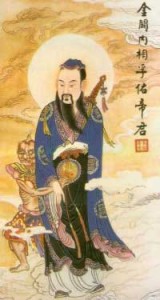Taoism
 The human being follows [the laws of] the earth, the earth follows the heavens, the heavens follow God, and God must follow nature [Tao], Tao Te Ching
The human being follows [the laws of] the earth, the earth follows the heavens, the heavens follow God, and God must follow nature [Tao], Tao Te Ching
The Quanzhen (Complete Reality Sect) Derived from the philosophical doctrines of Lao-tze, Taoism is traditionally held to have originated in China, over 2000 years ago. Taoism views the Universe as one large organism of powers and influences. It is a Path or Way to live in which people strive to cultivate the highest and purest development of their true nature within the dominion of the greater universe. Nature in Taoism thought signifies that which is primal and original and generally includes in its connotation the idea of the substance (energy and activity) of the universe. It is with this foundation that the Taoist strives to live their life according to that which a thing is at birth (as opposed to that which is acquired or added from external sources) amid its natural place within Heaven and Earth. It is when human return to their true nature and are aligned with the rest of nature; order and harmony are the result.
- Taoism is an ancient tradition of philosophy and religious belief that is deeply rooted in Chinese customs and worldview.
- Taoism is also referred to as Daoism, which is a more accurate way of representing in English the sound of the Chinese word.
- Taoism is about the Tao. This is usually translated as the Way. But it’s hard to say exactly what this means. The Tao is the ultimate creative principle of the universe. All things are unified and connected in the Tao.
- Taoism originated in China thousands of years ago.
- It is a religion of unity and opposites; Yin and Yang. The principle of Yin Yang sees the world as filled with complementary forces – action and non-action, light and dark, hot and cold, and so on
- Taoism includes many deities, that are worshipped in Taoist temples, they are part of the universe and depend, like everything, on the Tao
Taoism promotes:
– achieving harmony or union with nature
– the pursuit of spiritual immortality
– being ‘virtuous’ (but not ostentatiously so)
– self-development
Taoist practices include:
– meditation
– feng shui
– fortune telling
– reading and chanting of scriptures
Quanzhen School
The Quanzhen (literally: “Complete Perfection”) School, commonly called Complete Reality in English, is a major sect of Taoism that originated in Northern China. It was founded by the Taoist priest Wang Chongyang in the 12th century, during the rise of the Jin Dynasty. When the Mongols invaded the Northern Chinese (Song Dynasty) in 1254, the Quanzhen Taoists were among those who exerted great effort in keeping the peace, thus saving thousands of lives, particularly those of Han Chinese descent. This branch of Taoism is also mentioned frequently in Jinyong’s popular wuxia novels, including the Condor Trilogy.
Foundation Principles
The meaning of Quanzhen can be translated literally to “All True” and for this reason, it is often called the “All Trueth Religion” or the “Way of Completeness and Truth.” In some texts, it is also referred to as the “Way of Complete Perfection.”
With strong Taoist roots, the Quanzhen School specializes in the process of “alchemy within the body” or Neidan (internal alchemy), as opposed to Waidan (external alchemy which experiments with the ingestion of herbs and minerals, etc). The Waidan tradition has been largely replaced by Neidan, as Waidan was a sometimes dangerous and lethal pursuit. Quanzhen focuses on internal cultivation of the person which is consistent with the pervading Taoist belief of Wu Wei, which is essentially “action through inaction.”
Like most Taoists, Quanzhen priests were particularly concerned with longevity and immortality through alchemy, harmonising oneself with the Tao, studying the Five Elements, and ideas on balance consistent with Yin-Yang theory. (ectracted from Cultural China)
Instructor: Dr. Anthony D’Angelo, DMQ received his Doctorate in Medical Qigong in 2012 and has extensive training in medical qigong at the International Institute of Medical Qigong. He is an ordained 22nd Generation Taoist priest, under the Long Men Pai Sect of Taoism.

